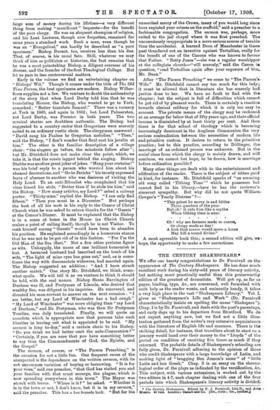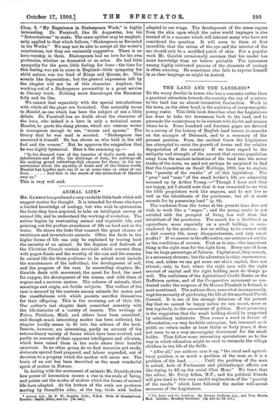THE CENTURY SHAKESPEARE.* WE offer our hearty congratulations to Dr.
Furnivall on the appearance of The Century Shakespeare. He has done much excellent work during his sixty-odd years of literary activity, but nothing more practically useful than this praiseworthy edition of the greatest of dramatists. Well got up, as far as paper, binding, type, &c., are concerned, well furnished with such help as the reader wants, and eminently handy, it takes a very high place in the vast "Shakespeare Library." Vol. I. gives us "Shakespeare's Life and Work" (Dr. Furnivall characteristically insists on spelling the name " Shakspere "). Chap. 1 is by Dr. Furnivall, and deals with the poet's parentage, and early days up to his departure from Stratford. We do not expect anything new, but we find not a little illus- tration gathered from the writer's very extensive acquaintance with the literature of English life and manners. There is the striking detail, for instance, that travellers about to start on a journey would hand over their money to the " Lloyds " of the period on condition of receiving five times as much if they returned. The probable details of Shakespeare's schooling are fully given, Dr. Furnivall adhering to the opinion of those who credit Shakespeare with a large knowledge of Latin, and making light of "bragging Ben Jonson's sneer" of "little Latin and less Greek." Chap. 3 is an essay on the chrono- logical order of the plays as indicated by the versification, &c. This subject, with various extensions, is worked out by the two editors in 4-7, each chapter dealing with one of the four periods into which Shakespeare's literary activity is divided.
'Th. Century Shakespeare. Edited by F. J. Furnivall, Litt.D., and John Munro. 40 vole. London, Cassell and Co. [30s., cloth; 60e., loathanj
Chap. 8, "My Experience in Shakespeare Work," is highly interesting. Dr. Furnivall, like St. Augustine, has his " Retractations" to make. The same epithet may be emphati- cally applied to that which follows, "Shakespeare as Revealed in his Works." We may not be able to accept all the writer's conclusions, but they are eminently suggestive. There is no hero-worship in them. Shakespeare had no love for his own profession, whether as dramatist or as actor. He had little
sympathy for the poor, little feeling for home—the time for this feeling was yet to come in England—little sympathy for child nature, was too fond of Kings and Queens, &c. This
sounds like depreciation; but the general impression left by the chapter will not be of this character. Anyhow, the working out of a Shakespeare personality is a great service to literary truth. Nothing more discourages the Baconian folly and its like.
We cannot deal separately with the special introductions with which all the plays are furnished. One naturally turns
to Hamlet, as one which has been the subject of not a little debate. Dr. Furnivall has no doubt about the character of the hero, who indeed is a hero in only a technical sense.
Hamlet, to quote the slang phrase, which our veteran writer is courageous enough to use, "moons and spoons." The theory that he was mad is scouted. "Shakespeare has answered it himself. He has shown us who held it, the old
fool and the women." But he approves the suggestion that he was highly hysterical. Here is the summing up :—
"In his diseased view of the beauties of God's earth and its inhabitants and of life; his shirkings of duty, his puttings-off, his making grand subterfuge-full excuses for them ; in his un- certainties about the mystery of death and of the future world, Hamlet but typifies each one of us at some time or other of our
lives And this is the secret of the attraction of Hamlet over us."
This is very well said.















































 Previous page
Previous page